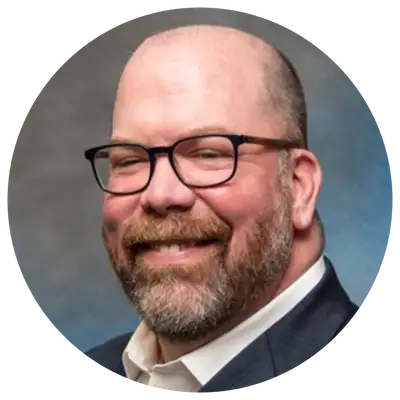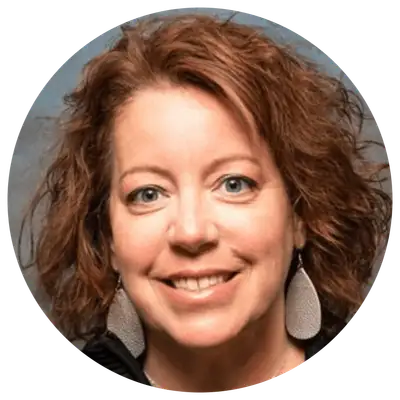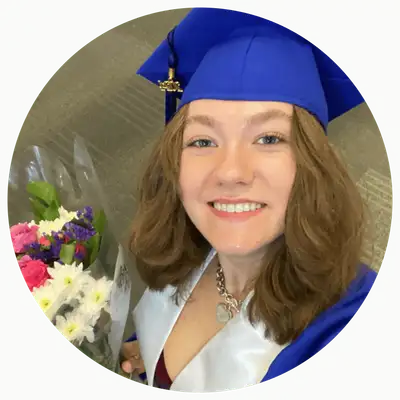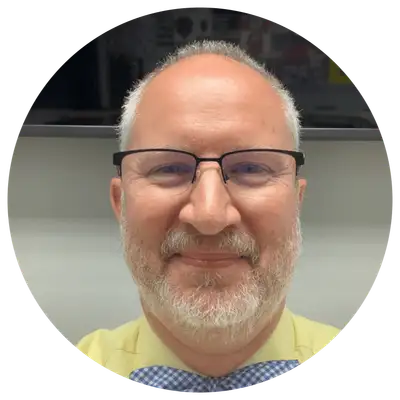
American Political Thought and Radicalism – Part 1
David Strausbaugh: A lot of students, they find that they might agree more with folks they originally thought they would disagree with more. So it does kind of build some common ground in some cases.
Speaker 2: That was David Strausbaugh, a social studies teacher at Worthington Kilbourne High School. This episode is the first and a two-part series for our theme Democracy Starts in the Classroom. On this episode of The Conversation, John and Rachel will learn about David's American political thought and radicalism class and hear from one of his former students, Bella Selph, about how the course opened her eyes to new ideas and perspectives. Let's dive in.
John Hambrick: Hello and welcome back to The Conversation, Ohio Voices in Education, igniting ideas, inspiring change, and what a timely conversation today. Our topic brings in a social studies teacher and a student talking through American political thought and radicalism. I am super excited to have Davis Strauss Strausbaugh from Worthington Kilbourne said, social studies teacher and Bella Selph, a 2024 graduate of Worthington Kilbourne. And again, both thank you so much for being here on The Conversation. And along aside me, my esteemed colleague Rachel Daniels, who will be joining this conversation. David, I'm going to start with you first, please. Can you tell us a little bit about yourself and the course that you're teaching, American Political Thought and Radicalism?
David Strausbaugh: Well, thank you. It's a pleasure to be here. I just completed my 25th year at Worthington Kilbourne High School. I've been teaching the course American Political Thought and Radicalism, which we call Poly Rad for over 20 years now. And the course is one that is offered both at Worthington Kilbourne High School and at Thomas Worthington High School. So both high schools in the Worthington School District. It's a senior elective, senior only, and it's been taught in the district for about 50 years now. Started in the mid 1970s and a lot of it was generated by some of the student protests that were taking place in the late 60s and the early 70s. So the course has been taught now 50 years, I've taught about 20 years at Kilbourne. And we look at contemporary issues, we look at groups who we would consider to be radical on both sides of the political spectrum, and we have a number of guest speakers who come in from both sides of the spectrum to present to the students.
Rachel Daniels: I have a tough question for you out of the gate here, David. I'm going to ask you to think about your main objective or hope for students who are taking this course. Poly Rad, I love that. And I'm curious, what's the one takeaway that you hope they get from this historic course?
David Strausbaugh: Well, a couple of goals I guess, of the course. One is for students to kind of see the entire political spectrum. What I tell the students is, "When you take government class, you're focusing on the middle of the political spectrum and Poly Rad, we look towards the edges," and just the whole notion of radicalism. And we tend to think of radicalism, we associate with violence and anger and whatnot, and that can be true, but it's interesting how folks who are considered radical in the past are now considered to be heroes. People like Martin Luther King and Frederick Douglas and other folks who are seen as kind of iconic, if you will. And so it's kind of interesting to see how radicalism challenging the status quo, if you will, how that can be viewed in the present, but also in the future and how people will look back on it.
Part of that is to gain an appreciation of what is radicalism. Part of it is to better inform students about political activities, political movements that are going on, and really exposure to different ideas, different thoughts. For a lot of students, they want to take the class because they feel they've been quote, unquote, "In the bubble," and going to college and all they know they're going to be exposed to different ideas. And so they want to taste of that, if you will, in Poly Rad. And so it's a way of showing kids the spectrum of ideas, but to do so in a high school setting and in a classroom environment where we can talk and filter through what's being said. And so for students there, I hope they individually get a sense of, "Okay, here ideas are being talked about and now I can evaluate them and see what's good, what's not. To do so in a context of classroom discussion with my peer, with the teacher, but also just a chance to have civil discourse."
And that's something we emphasize in Poly Rad. We do a lot of what's called debriefing. After a speaker, we talk about what the speaker brought up, and that leads to conversation. And there's no prerequisite. Anybody can take Poly Rad. So you're going to get a range of students, all sorts of abilities and interest in political perspectives. So you have to learn to agree to disagree and to do so in a civil way. So hopefully students also get that skill as well.
Rachel Daniels: David, as I was thinking of our conversation today, that was one question percolating is how much discourse happens as a literacy expert and huge proponent of discourse in the classroom. I'm so glad to hear that bubbling up to the surface because as we know, all of us in this world could do better learning how to just engage in productive conversation. So I love that you're providing an opportunity for students to learn that really important soft skill.
David Strausbaugh: And especially a lot of communication goes online and everybody kind of has their lane, if you will. And so being forced to get out of one's bubble, lane, whatever you want to call it, can be helpful. And also I think for a lot of students, they find that they might agree more with folks they originally thought they would disagree with more. So it does kind of build some common ground in some cases.
John Hambrick: I have to imagine, like myself, our listeners like, "What kind of topics are you discussing? Who are your visitors that are relevant for this Rad course?"
David Strausbaugh: I divide the course into two subjects. The first is radicalism, how do we define it? And then oftentimes it's in terms of two things, ideas and tactics, radical ideas in terms of, "Hey, we need to change the system. Why do we need to do that?" And then the tactics of, "Okay, well how do you go about that? Can you do that with violence or nonviolence? Is violence ever justified?" And that leads to a discussion. And then what we'll do is begin to transition more specific groups within that first unit. Let's see, I'm starting to line up next semester. We'll do a unit on white supremacist groups, [inaudible 00:08:12], neo-Nazis, conspiracy thinking, Illuminati, Q Anon, anti-government groups, militia groups, sovereign citizens. Now I want to do a little bit more on patriarchy and male supremacist movements, groups like Incel and Trad Wife movement. And then we talk about far left, we'll talk about socialism, communism, Antifa as well.
So that's the first unit. And the second unit is a little bit more in terms of social movements, social justice movements, LGBTQ issues, issues about racism, issues about animal rights, and about feminism broadly defined. And especially issues regarding, for example, sexual assault, sexual abuse. And so we try to cover as much as we can. We have a semester, so I tell people, "It's a buffet. You're going to get a little of a lot." But for a lot of kids at least they're exposed to what's out there and then they can follow up on their own.
John Hambrick: Do you have a particular topic or speaker that was most memorable for you as an educator and why?
David Strausbaugh: Yeah, there have been a couple. Currently, I think somebody who I find very intriguing is Bill Ayers, who was a member of the Weather Underground. They were a radical group, anti-war group in the late 60s, early 70s. They literally were underground, they were hiding from the FBI. And since then, he was an education professor for many years, and then he, in 2008 election, I guess became public figure again. But he is retired, he and his wife. And it's just always interesting to hear them because obviously they have a political story, but they have an educational story as well, and how do we learn and what do we learn? And so I always enjoy hearing from him because he has interesting ideas that challenge us politically, educationally as well. I think the students find very interesting, very engaging. We've had some more confrontational speakers, and I mean that not physically, but just... and recently Coach Dave Dome from Past Assault Ministries, he likes to challenge the kids, especially more on those who are on the liberal side of things.
Years ago, gentleman named Brad Peterson who was a fiercely devoted conservative Christian, patriot, he was an experience, but he was great. I mean, kids, he really got kids. Thinking in terms of topics, one that I thought was just kind of... I started about 2006-7, was an issue on animal rights. And that seems to really, of all the topics, really get the kids thinking, because you just eat animals, we wear them. You just assume that. And then to say, "Well, why? And can we do better?" And for a lot of kids who would consider themselves very progressive on other issues, they don't think twice. And then to start challenging them and say, "Well, in order to consume animals, we have to kill them. And is that ethical?" And it gets a lot of thinking. So that's a topic, that's a unit that a lot of students, when they reflect at the end of the course, say, "That really changed me." Some students become vegetarian and vegan as a result of that.
Rachel Daniels: What a perfect segue into what we're excited to launch here on the conversation, and that is a student perspective. It's been intriguing to hear about the topics that you're sharing, and I am so curious about how students are impacted by this work. John and I are excited to introduce our listeners to Bella. Bella, welcome to our podcast. Congratulations on your recent graduation from Kilbourne. Here's what we'd like you to consider and share with us. From your student perspective, how has this course impacted you in the way that you see the world around you?
Bella Selph: Hi, I'm really glad to be here. I'd say, this course has definitely really impacted the way I interact with the world and the way I view the world. I mean, as Dave mentioned, a lot of students go vegetarian after the animal rights unit, and I can proudly say that I went vegetarian after the animal rights unit and I've been vegetarian ever since. And that was actually already a very emotional and impactful topic for me. It was very important to me and going more in depth to it in the class, I was able to learn things I actually didn't know. We learned, for instance, not just about the ethic or the ethical implications of it, but the health concerns or the environmental concerns, which I had no idea about. I had just been aware of the ethical concerns. So that was really influential for me, I'd say. And not only that, the class really helps me become more politically active. I went to animal rights protests. I'm active in several animal rights groups now. I really go out of my way since this class to immerse myself in the current political landscape.
I try and learn about new movements and I try and be active in issues that are important to me. I'm a registered voter now that I'm 18. I feel like before the class, I was more content to be not ignorant, but I wasn't seeking it out. I wasn't trying to participate as much as I could. I wasn't trying to make the change. I had opinions, but I wasn't participating. And this class really encouraged me to participate and it helped me feel more strongly about my beliefs and to identify things, my own beliefs. With the presentations that we'd see the speakers, I was able to identify the things that I felt were very important to me, and I was able to learn about current political movements or the history of current political movements or the history of past political movements. And I feel like that really helps me understand the world and understand my own beliefs a lot better.
Rachel Daniels: That's such an impressive result of, as I said before, a historic course that's been around for a long time. From a research perspective, it would be so intriguing to speak to students across this 50 years to hear stories like the stories that you're sharing about becoming a vegetarian based on information that you didn't have previously. I really appreciate thinking more broadly about the impact that a course like this can have really on a student in the moment, but also as students become part of our voting society. That's what I think our goal is to create a space for students to become thinking learners and always sort of seeking to know new things.
John Hambrick: I think it's incredible that, Bella, thank you for sharing, that we can actually have identified behavioral change as a result of not only what impact is this going to have for me as a high school student in a high school class, but it's very evident that this one particular topic had impact with you. And then not only as you change your behavior for consumption, but for your participation. And so kudos to you for that, and I hope that you bring your recent graduates alongside with you for all of these as well.
Rachel Daniels: John, that leads me to a follow-up question for Bella. I'm curious, and you don't need to share names or causes, but from the contemporaries you took the course with or just folks that you know from your school experience, do you have any other examples of deeply impacted topics that you saw creating a movement in any of your classmates?
Bella Selph: Just for the animal rights, the girl who sat next to me in class, and she actually became one of my greatest friends after the class. She's awesome. She was vegetarian before the class and she actually helped me plan and attend an animal rights protest that we did at a auction house in Mount Hope. She has been writing articles about the protest that we did, and I know that she's planning on furthering her participation in the animal rights sphere. And I remember there was one other time that really impacted the class. We had just had a speaker come in and she had talked to us about her personal story of a sexual assault. And I know that it struck a chord with everyone in the class, particularly the girls in the class. We all really felt it. But I remember we were talking about it afterwards, and I had asked the question, I had asked, "Raise your hand if you've ever been cat-called by a man." And I believe it was like all but four girls in the room raised their hands. And it really made everyone consider the experience of a woman in America.
And I don't know if anyone's going to do anything with that, but I know that it really impacted other students. And we talked about it after class, and every student I talked to said that they were really resonating with it with that story in that moment.
Rachel Daniels: Well, it seems clear that what's happening in this classroom doesn't stay inside the walls of the classroom, it's trickling out. And that is exciting. And I think Dave, I'll speak for all educators and say, "That's our hope, for things to leave the classroom."
John Hambrick: Bella, thank you for sharing. Dave, I'm going to come back to you again. You shared a little about some of the topics that you plan for the next school year, for our coming school year. I'm curious, how is artificial intelligence and AI and all the significant changes and impact that's having in our culture, how is that being woven in to your course?
David Strausbaugh: I think just to explore what impact that has in terms of the larger narratives that are being created. I think there is an AI generated image about Rafa, about what's going on in Gaza, and that's gotten a lot of attention and it's... I don't know a whole lot about it, so I have to do research, but that's shaping this public discussion. The public sphere, if you will, is that now stories, images can be generated that can shape how people perceive an issue. And then what's considered a good source? Where do we get our information? What's reliable information? How do you find common ground when the algorithms are leading you down different paths? So that's a conversation to have in the class. It's a challenging one, it's a relevant one, but it's unfolding and that's part of the beauty and challenge of Poly Rad is everything is unfolding. A lot of it is also leaning on the students and what is their experience and what do they see unfolding as well. It's something that has to be addressed. I'm working on addressing it as best as I can.
Speaker 2: Stay tuned for part two of the American Political Thought and Radicalism episode.
Creators and Guests



